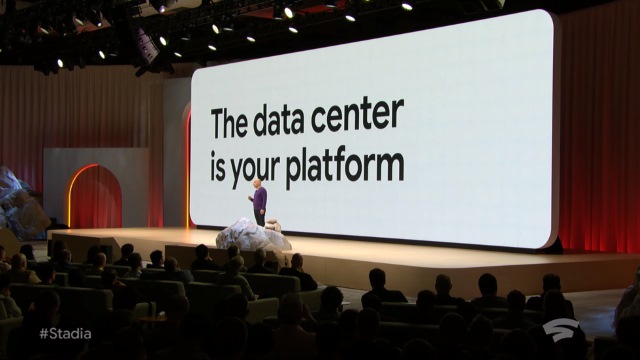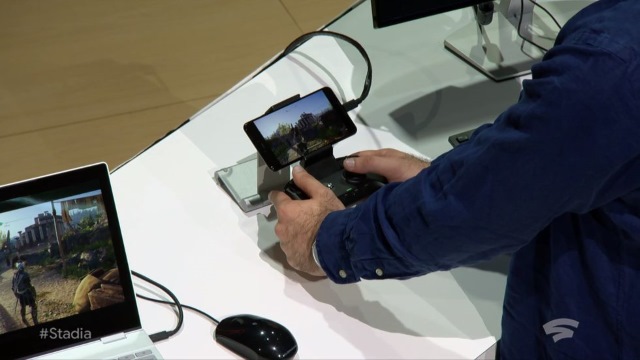Have we learned nothing from the follies of other cloud-based streaming services? Have we not learned that internet infrastructure in the United States isn’t up for the task with this sort of technology?
Maybe first impressions really do mean everything.
Putting a Dreamcast, a Power Glove, and a copy of the Atari’s E.T. on display as “dream projects” to build hype before Google’s Stadia reveal presentation didn’t exactly instill confidence. It seemed more tone-deaf and misguided than anything, considering the histories of all three.
I’m not sure about you, but I wouldn’t reveal a new hardware venture by comparing a new shiny toy to a console that saw the end of Sega’s hardware division, a peripheral that failed on all fronts, and the game that stands as the poster child for the video game crash of ’83.
My utter lack of enthusiasm for Google Stadia isn’t just caused by the comparison to three failures (I am so sorry, Dreamcast), but how other cloud-based or in-home device game streaming is simply not up to snuff for most people outside of city centers. It’s compounded by how Google has treated past failed projects.
The dream of being able to play every Stadia game on any device that is Google Chrome-compatible is enticing. Chrome is on almost everything these days. You probably have it on your computer, it’s definitely on your phone if you use Android, and it’s on plenty of smart TVs as well. It’s easier to find a device that’s compatible with Chrome than it is to find one that’s not.
Considering Stadia, there are three questions anyone paying attention might have:
- Will their in-home internet connection be able to handle persistent cloud-based game streaming?
- Will there even be worthwhile games on the Stadia?
- Will Google even continue to support it if doesn’t do as well as hoped?
The Internet Problem
The unfortunate reality is that most areas in the United States simply don’t have the bandwidth to handle persistently streaming games off the lofty “cloud” without interruption.
It’s easy to look at ISP data rates across the country and assume everyone has a connection of 80 Mbps or more, but the speeds people actually see in their homes is another story.
At the reveal, Google claimed the Stadia would be able to play games at up to 4K, 60fps when used with a 30 Mbps connection. It was also stated that if your connection is below 30 Mbps, the Stadia will output at a lower resolution, such at 1080p pulling 25Mbps.
Anyone who has used any of the current cloud streaming services has good reason to be wary of this claim, considering how the current offerings handle dips in internet speeds or just poor connections in general.
I myself subscribe to PlayStation Now and have used it on and off for a while. There is a reason the service now allows subscribers to download PlayStation 4 and PlayStation 2 games directly to the console. That reason is latency.
You may have used Now, maybe not. Maybe you’ve used another cloud-based streaming service, maybe not. But one thing is for sure: the troubles are the same for anyone who uses one with a sub-par internet connection in any case.
Though not streaming from a cloud, Steam Link owners have similar experiences despite streaming between devices within their own homes. It recommends you use a wired connection for a reason.
Latency spikes can and often do cause significant input delays and video artifacting. While artifacting is one thing that doesn’t bother me too much when using cloud-based streaming services, input lag is a real killer. Nothing kills your gameplay session harder or faster than a hefty dose of input lag keeping you from pew pewing on time.
Google has touched on how it will handle infrastructure on their end, but how that will affect the end user is still yet to be seen. It’s only natural for the consumer to question how well this sort of service will work, particularly when given minimal information about its net protocol.
You would think that’s an important enough part of the device and service that Google would address the topic head-on as soon as it was announced.

Games on Google Stadia
Let’s not try to pretend the Stadia is going to be for hardcore gamers. Despite all of the press being pushed around gaming sites and Doom Eternal and Assassin’s Creed Odyssey being confirmed for it already, this is still a device from Google and it knows where the money is.
Spoilers: It’s not in hardcore gamers.
It was already stated that data center PCs will be running on Linux, a vague statement in itself. What the consumer may not remember is that Android operating systems as a whole are based off of Linux. Android is technically a Linux OS.
Considering the Stadia and the size of Google Play as well as what developers are already capable of developing for the mobile market, it’s not that far of a stretch to theorize that the Stadia’s games at large won’t be that far from what’s on Google Play.
The announcement of Doom Eternal on the platform to start is one way to catch the interest of hardcore gamers, but from a certain standpoint, one can look at the announcement as sort of the other side to Blizzard’s Diablo Immortal announcement — pitching what would normally be considered a core IP on a platform that doesn’t quite align with core ideals and habits. Just this one’s less blind to its audience.
Like people, companies don’t just change their habits overnight or even in the span of a few months. The Google Play Store is not what anyone would consider a fully functional or impartial storefront.
I have to pay a little too much attention to the Play Store for my day job, and there are some trends that persist within it that would quickly sour the core gaming community, but there ones that the more casual end of the spectrum just accepts and wallows in.
The biggest of these trends is:
- A clear bias toward higher grossing games across the board
- Older games becoming increasingly hard to find, with the only real method being to directly search for a game’s title
- Broad categories with few titles actually shown within them, with all that’s easy to come by being the newest or most popular
Anyone can understand why this is the case since any company is trying to make money, but you have to wonder how Google is going to maintain Stadia’s storefront if this is how the company maintain Google Play.
Furthermore, one has to question the permanence of any title on the platform. What happens when a game isn’t profitable enough over a long period to keep offering it on the cloud?
The Target Demographic Isn’t A Mystery
The gaming community online likes to act like it has real money-pushing power, but the truth is it matters very little when compared to the droves of people that turn to games just to burn some time among the mundanity and tedium of everyday life.
Core gamers are not likely the target demographic for Stadia. Why would they be? The community’s first response to a mobile game announcement is a collective “Ew,” without even having seen the product. Stadia is not for these people.
The ability to play a single game on a plethora of devices using the very same save data with no hurdles is, to the core game community, a pipe dream. But the core community wants a latency of 30 to a server across the country and whines about losing a few frames out of 60 in games where that doesn’t even matter.
Whatever Google has in store for the Stadia may be advertised as being for “gamers,” but its real target is the casual market because that’s where the money is, and it’s a lot easier to please than the hyper-critical hivemind that games as a hobby.
As a reveal, Google Stadia isn’t a particularly exciting piece of technology. Cloud-based game streaming is something we’ve seen done through several services, but if any one company were to jump into the market and have the resources to do it right, it would be Google.
There are too many questions left unanswered to truly draw many conclusions, but one has to temper their expectations. No one should expect the Stadia to be a core gaming platform. An expansion of the mobile gaming space, maybe. But not a core platform.








Published: Mar 21, 2019 01:30 pm